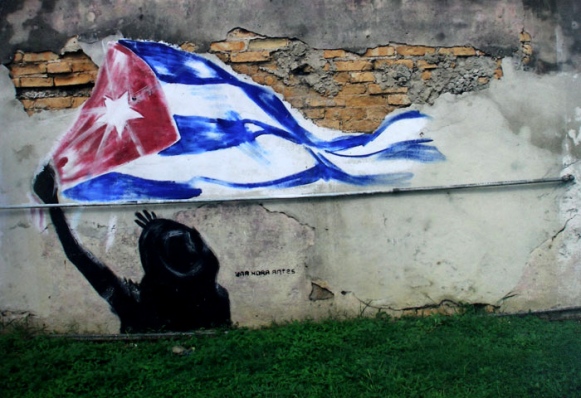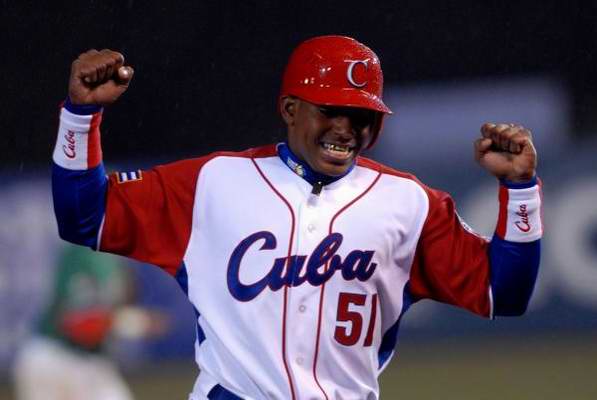Chapter 3: Dissident Muralist*

- Photo: Danilo. País de Píxeles. “El Sexto”
The procedure was simple. Very simple. You looked for a piece of cardboard and painted it with a phrase against the Government. You hung it around your neck and went out into the street. Like in the reality shows where a naked man comes out into the light of day starkers, and his challenge is to reach a determined goal without law enforcement stopping him. Well, here you wouldn’t last two blocks with a sign around your neck.
You could also opt to choose a city wall and appear before it with a can of paint in hand, and decorate it with one of those phrases against Fidel Castro and his brother Raul, the Communist Party, the system, or something along those lines. You could be sure: in this way, before you’d finished the last word, you’d hear two or three dry brakes screeching, and then the cold metal of the handcuffs on your wrists.
Now, painting signs on walls you would run a risk: that your phrase would never be finished. As you wouldn’t know at what point in the expression you would be arrested, you’d hope that the police would be delayed a few moments (not likely) and then finish your work and the sign would have a reactionary sense. Otherwise, you might fail. Why? Because a sign that just said “Dow” is not classified as a subversive activity, but rather as disorderly contact: no one gave you permission to paint a wall. It has the same connotation as breaking a window or peeing in a public place. Just that. Perhaps if you had no prior criminal incidents, they would fine you, or, in the worst case, put you on house arrest. The Social Environment Department would send you a letter announcing to you, on their part, a further fine of one thousand pesos for your act: you had marred the adornment of the city. And then you’d be left with the ugliness of two fines to pay, and you wouldn’t be a prisoner. Much less have the category of a political prisoner, which was what you needed.
An example: Aristides Bazán. Professional historian. When he exhausted his legal tricks, always unsuccessful, to teach at other universities in the world, he understood something: they would never let him out for being good. The professor was a potential emigrant, and this could not be allowed. Then, he knew what he had to do.
He armed himself with a rectangular acrylic, six feet long by some ten wide. With a black marker he wrote on it a beautiful and vast idea of the immortal José Martí, Apostle of Independence and the first modernist of poetry. He had read the martyr in a letter to his close friend Fermín Valdés Domínguez, and since then had said surreptitiously repeated it to some of his students. He wrote exactly:
“The socialist idea has two dangers, like so many others: that of foreign, confused and incomplete interpretations, and that of the arrogance and hidden rage of the ambitious, who, in order to rise in the world, begin by feigning it, to have shoulders to climb on, frenetic defenders of the helpless…”
Aristides Bazán did not have the soul of a pilgrim to exhibit his reactionary sign in the street, nor a Mexican muralist to decorate public spaces, so he opted to hang this thought in the door of his house and to have his things ready.
He is still waiting, today, for his arrest. The laws of the country changed without his acquiring a passport as a prisoner of conscience. It’s true that in the short time he exhibited the banner on the facade of his house, three plainclothes officers and then three more in uniform, took notes, shot photos, and quietly discussed some things quietly. Apparently they took the evidence to their laboratories. But Professor Aristides never managed to be taken prisoner. After a long time, he confessed that perhaps he was not very clear in his positions. He should have chosen something more transparent. If you want to achieve something quickly, it should not be very difficult for the enemy.
But there’s more. Nor should it leave room for manipulation of information. A poster should have enough personality to deliver a single, unchanging idea. Otherwise, the enterprise could not be successful.
Another example: January 1, 2000 a drunk with a desire to try his fortune in other lands woke with desires for freedom. Without rinsing his mouth, belching alcohol, he appeared with a blue-green crayon in front of City Hall. There, he chose the wall of a House of Culture for his ideological brush. He wrote, with great double letters: Freedom. And sat down under to await the agents. The previous day he had advised a nephew who lived in the North: Get ready, soon we will be celebrating together. When he woke up, in a stinking cell at the Municipal Police Station, the damage was already repaired. A local artist had taken advantage of the space, instead of being allowed to repaint the facade of the House of Culture. In its place he had written: Freedom Was Born Without a Master, signed: Silvio Rodriguez, and a handful of white doves with Cuban flags in their beaks finished off the mural.
The poor fellow spent three months on a farm, and then was back on the street.
So, where were we. The concept of a sign. No one knows why, but one of the cardinal sins of the system has always been a sign on a wall. These rulers have felt a real weakness for them. From the time when they risked their lived to decorate a wall with red paint with the inscription: “Down with Machado.” It may seem exaggerated, but it’s the truth. There were those who threw firecrackers at the houses of the henchmen, those who went on strike…and those who wrote signs. I never have understood how it could bother me it a sign appeared somewhere with “Down with” my name. If they did it on my own facade I might cuss them out, but if it’s some other, I don’t care.
But here he was upset, and how. He would never escape. For serial killers and perpetrators of crimes against humanity, there was the possibility of evading the investigations. But for sign painters, not one. Those who did it with a true subversive vocation, were imprisoned. Those who did it to leave the country, the same. The method was infallible. The Human Rights organizations automatically inscribed your name among the prisoners of conscience. It was a matter of surviving behind the bars. Once out, you presented yourself at some conflicting embassy as a persecuted politico, and then after a couple of months of confirmations, they awarded you a visa. Even your family was included in the pack.
The process gained many followers and became a business. Whoever had a white wall on his property could make some money. But they had to contract with a night watchman to watch the area at night, and a guard to do the same during the day. To write on the wall, you had to pay. Obviously, the more central it was, the more it cost. After collecting his pesos, the owner retired the watchdogs and set a specific time. After the police took the guy, the owner of the wall repainted it a perfect white. Erased it, like a blackboard. Waiting for the next cave artist.
Those who decided to hang their sign, just in case, also crossed the palm of the president of the block’s Committee for the Defense of the Revolution, to call the police and tell them who was the author of the work, and even a couple dominoes players, who acted as witnesses. They thanked him, too. Wished him luck on his future journey.
But there is not good that lasts a hundred years. At some point the breach was sealed. A coming together of Justice reform and the Penal Code, and the sign painters lost their bargain. Worse: they begin to take it into account in their judgments. Ignorance of the law is no excuse. Henceforth, the courts sanctioned them with the most twisted and brilliant euphemisms (apart from the handy Disturbance of Public Order, they came up with Mistreatment of Social Property, Citizen Dangerousness, Civil Disobedience, and many more…), but the name “Political” was never used again.
At that time, we had just learned of another possibility about to be extinguished. You had to go, flashlight and map in hand, to the tunnels of the resistance. Too many of us were continuing behind the bars of smoke and water, and an excellent escape tunnel had to be dynamited.
———————————————————————
* This text belongs to literary fiction, not journalism. It is part of a separate volume of stories (most of them far from any Cuban context) entitled The Renegade, although this is Chapter 3 of a kind of macro-story that links everything at the end. A book I have not finished (but almost), halfway between a novel and short stories.
July 27 2011




